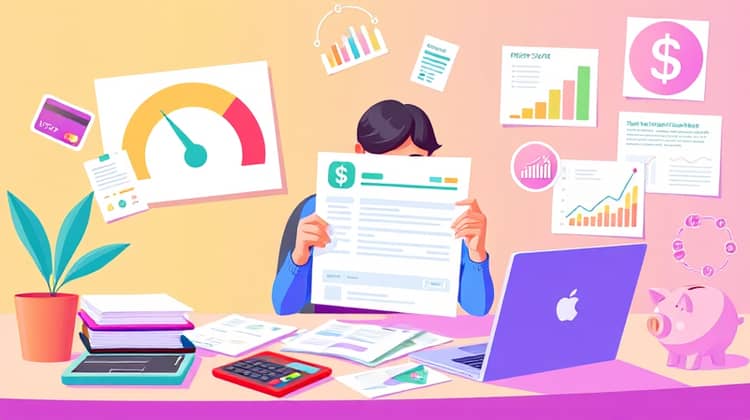Managing your personal loans is critical for maintaining financial health, especially in today's economic landscape where borrowing can put significant stress on your finances. By being proactive with your loan repayments, you can avoid penalties while contributing positively to your overall credit profile.
To maximize your success in repaying your loans, it's essential to implement strategic financial management practices. This guide is designed to provide you with key insights and actionable steps to help you manage your personal loan repayments effectively.
Create a Realistic Budget

Creating a realistic budget is the first and foremost step in managing your personal loan repayments efficiently. A well-structured budget helps to track your income and expenses, ensuring you allocate enough funds toward your loan payments each month.
Begin by assessing your total monthly income, which includes wages, salaries, and any side earnings. Once you establish this figure, account for all monthly expenses—such as rent, utilities, groceries, and discretionary spending—to determine how much money remains for loan payments.
Designate a specific portion of your remaining funds to go toward your loan repayment every month. This will not only ensure timely payments but also allow you to plan for any unforeseen expenses that arise.
- List all sources of income and sum them up.
- Identify fixed and variable expenses to calculate remaining funds.
- Set aside funds specifically for your loan repayment based on your budget surplus.
Understand Your Loan Terms

Understanding your loan terms is crucial in managing your repayments efficiently. Each personal loan comes with specific conditions that dictate how much you owe, when payments are due, and the total repayment timeline. Being familiar with these details can prevent potential financial pitfalls.
Make it a point to review your loan agreement thoroughly. Look for details such as interest rates, grace periods, and any prepayment penalties. This knowledge empowers you to avoid costly mistakes and can help you strategize your repayment plan more effectively.
- Know your interest rate and whether it is fixed or variable.
- Understand your repayment schedule including due dates and amounts.
- Be aware of any fees that may apply, such as late fees or prepayment penalties.
Set Up Automatic Payments

Setting up automatic payments is a simple yet effective way to ensure you never miss a loan repayment. By directing your bank to automatically transfer funds to your lender, you take the stress of remembering due dates out of the equation.
Moreover, many lenders offer incentives for setting up automatic payments, such as lower interest rates or fees. This could save you money in the long run and ensures your payments are always made on time.
- Visit your bank's online portal to set up automatic transfers.
- Choose the payment date wisely to ensure sufficient funds are available.
- Regularly review your bank statements to confirm payments are processed accurately.
Additionally, if your financial situation changes, be sure to adjust your automatic payments accordingly to avoid over drafting your account.
Prioritize High-Interest Debt

If you have multiple loans or debts, prioritizing the repayment of high-interest loans can save you a significant amount of money. High-interest debt can quickly accumulate and lead to a debt spiral if not managed correctly.
- Identify all debts you have and their respective interest rates.
- Focus on making larger payments on the loan with the highest interest first while making minimum payments on others.
- Gradually shift surplus funds to other debts as high-interest loans are paid off.
This approach is known as the debt avalanche method, and it helps reduce the total amount of interest you will pay over time.
Consider Refinancing or Consolidation

If managing multiple personal loans is overwhelming, consider refinancing or consolidating them into a single loan. This strategy can simplify your payments and potentially reduce your interest rate altogether.
- Evaluate your current interest rates and loan terms upon refinancing.
- Research options to consolidate, ensuring you choose reputable lenders.
- Submit an application for a new loan which will pay off your older debts for a fresh repayment plan.
Before making this decision, weigh the benefits against potential fees for refinancing or consolidation to ensure it is financially advantageous.
Avoid Late Payments

Avoiding late payments is crucial for maintaining a good credit score and avoiding additional fees. Late payments can negatively impact your credit history, making it harder to secure future loans or credit.
Establishing a reliable payment system, whether through budgeting techniques or automatic payments, can help keep you on track. Additionally, keep an eye on your bills and set reminders in advance to prepare your payment accordingly.
- Set reminders on your phone or use calendar alerts for due dates.
- Keep a dedicated folder or app to track all your loans and their expiration dates.
- Regularly check in with your loan accounts to confirm payments are up-to-date.
Communicate with Lenders

Maintaining communication with your lenders is crucial. If you experience financial difficulties, do not hesitate to reach out to discuss your options. Most lenders are willing to work with borrowers who are facing challenges, providing alternative repayment options or temporary relief.
Being proactive in this area demonstrates responsibility and a willingness to manage your obligations, which can strengthen your relationship with your lender.
Track Your Progress

Keep track of your repayment progress to stay motivated. Create milestones such as paying off a specific percentage of your loan or reducing the principal balance by a certain amount. Tracking this can provide a sense of achievement as you work toward becoming debt-free.
Many banks and lenders offer tools that enable you to see the payoff timeline and track your payments.
Focus on Building Credit

While managing loan repayments, it is equally important to focus on building and maintaining a strong credit score. A good credit score can benefit you in getting lower interest rates on future loans and credit cards.
By managing your debts responsibly—such as making timely payments and staying within credit limits—you foster better credit health.
- Check your credit report regularly to spot discrepancies.
- Keep credit utilization low by maintaining low balances on credit cards.
- Diversify your credit portfolio by responsibly managing different types of credit.
Conclusion

Managing personal loan repayments effectively requires attention to detail, strategic planning, and discipline. The steps outlined in this guide, from budgeting to building credit, provide a framework for achieving financial success and alleviating the burden of debt.
By taking a proactive approach and communicating with lenders, you position yourself not only to meet current obligations but also to thrive financially in the long run.














